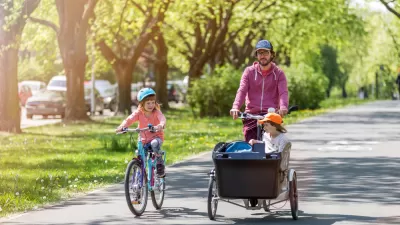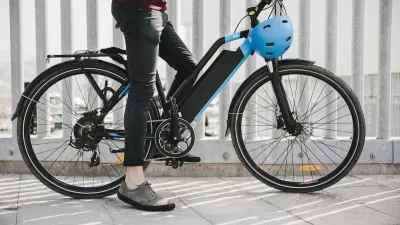A new white paper lays the groundwork for better e-bike incentive programs.

Kea Wilson reports for Streetsblog USA:
In a new white paper from Portland State University, researchers looked at more than 70 current, former, and upcoming efforts to subsidize the use of electric bicycles in the U.S. and Canada, and how those local programs might have an even bigger impact in the future — and eventually, win more funding at the local, state, and federal level.
As explained by Wilson, e-bike incentive programs can take many forms, such as rebates, vouchers, tax credits, and lending libraries. Many of these programs are already in place around the country. Denver’s e-bike rebate program, launched in April, is already proving popular. Los Angeles launched a Universal Basic Mobility program in April that included a lending library.
The benefits of e-bike incentive programs are measured in Vehicle Miles Traveled and Greenhouse Gas Emissions. “Early research has shown that 62 percent of North American e-bike trips replace a journey that would have otherwise been taken in a car, and access to e-bike share alone can reduce a city residents’ automobile mileage by 20 percent,” according to Wilson.
John MacArthur, sustainable transportation manager for the Transportation Research and Education Center at PSU, is quoted in the article describing the need to better make the case for the community benefits of e-bike adoption. To fulfill some of that purpose, MacArthur created an “e-bike incentive program tracker to see how the details of those North American programs stack up, followed by interviews with many of those programs’ administrators,” reports Wilson.
More findings from the white paper and the tracker can be found at the source article below.
FULL STORY: We Need More — And Better — E-Bike Incentive Programs Across America

Alabama: Trump Terminates Settlements for Black Communities Harmed By Raw Sewage
Trump deemed the landmark civil rights agreement “illegal DEI and environmental justice policy.”

Planetizen Federal Action Tracker
A weekly monitor of how Trump’s orders and actions are impacting planners and planning in America.

Why Should We Subsidize Public Transportation?
Many public transit agencies face financial stress due to rising costs, declining fare revenue, and declining subsidies. Transit advocates must provide a strong business case for increasing public transit funding.

Understanding Road Diets
An explainer from Momentum highlights the advantages of reducing vehicle lanes in favor of more bike, transit, and pedestrian infrastructure.

New California Law Regulates Warehouse Pollution
A new law tightens building and emissions regulations for large distribution warehouses to mitigate air pollution and traffic in surrounding communities.

Phoenix Announces Opening Date for Light Rail Extension
The South Central extension will connect South Phoenix to downtown and other major hubs starting on June 7.
Urban Design for Planners 1: Software Tools
This six-course series explores essential urban design concepts using open source software and equips planners with the tools they need to participate fully in the urban design process.
Planning for Universal Design
Learn the tools for implementing Universal Design in planning regulations.
Caltrans
Smith Gee Studio
Institute for Housing and Urban Development Studies (IHS)
City of Grandview
Harvard GSD Executive Education
Toledo-Lucas County Plan Commissions
Salt Lake City
NYU Wagner Graduate School of Public Service





























